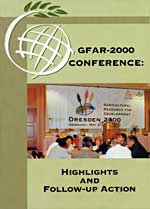
Prolinnova (Promoting Local Innovation in Ecologically-Oriented Agriculture and Natural Resource Management) is a global multi-stakeholder initiative that strengthens farmer-led innovation and participatory agricultural research. It stands out as a long-standing and transformative success of the GFAR (now GFAiR) Collective Action model—advancing inclusive innovation by grounding research and development in the creativity of local communities.
Origins: Farmer Innovation Takes Center Stage
Prolinnova was initiated in December 1999 at a meeting near Paris (Rambouillet), where NGOs from the Global South and North came together to develop a new vision for farmer-driven innovation in ecologically oriented agriculture and natural resource management. This meeting was supported by GFAR, the CGIAR NGO Committee, and the French Ministry of Foreign Affairs. Rather than being created by GFAR, Prolinnova was a bold, NGO-led initiative facilitated and legitimized through GFAR’s global platform.
The NGO meeting in Rambouillet (France), supported by GFAR, conceptualized Prolinnova as a response to top-down agricultural innovation models. The core ideas were refined early 2000 : support farmer-led innovation, build multi-actor platforms, and institutionalize Participatory Innovation Development (PID) and in May 2000 Prolinnova was formally presented at GFAR2000 in Dresden by Ann Waters-Bayer, with strategies for piloting and scaling innovation partnerships. These early efforts positioned Prolinnova within GFAR’s framework of Global Partnership Programmes, giving it access to international platforms, co-learning opportunities, and donor engagement.

A Collective Action with Lasting Impact
From these beginnings, Prolinnova evolved into a multi-country, multi-actor partnership, establishing national platforms in over 15 countries across Africa, Asia, and Latin America. Its impact includes:
- Empowering farmer innovation systems through Farmer Innovation Fairs (FIFs) and the International Farmer Innovation Day (29 November);
- Promoting Participatory Innovation Development (PID) as a core methodology for co-creation between farmers, researchers, and extensionists;
- Influencing agricultural R&D agendas toward inclusive, bottom-up approaches;
- Serving as an early model of GFAR Collective Action, with Southern actors in the lead.
Legacy within GFAiR
Prolinnova began as an NGO-initiated farmer-centered innovation network, matured through Promoting Participatory Innovation Development (PID), and eventually became formally recognized as a GFAR Collective Action in 2015–2018. This institutional shift embedded its farmer-led innovation model within global agri-food R&I systems, ensuring sustained advocacy and multi-stakeholder coordination.
As GFAR evolved into GFAiR, Prolinnova remains a flagship example of how locally led, globally supported innovation systems can thrive. It shows the power of Collective Action to shift the paradigm—from externally driven development to co-innovation rooted in farmers’ realities.
Throughout 2020-2021, the Global Forum on Agricultural Innovation Research and Innovation (GFAiR) facilitated an intensive consultation process in Asia-Pacific, as well as Africa, Europe and the Middle East. It resulted in the identification of several Collective Actions. One of the Collective Actions is on Agroecology. September 2024, 6 consortia were selected among 28 applications for the GFAiR call for "Letters of Intention (LoI) on Agrocology": APIRAS-APAARI, CACAARI, Prolinnova, PAFO, SEI and Helvetas.
Prolinnova and the GFAiR Collective Action Agroecology
The Institute of Natural Resources NPC (INR, South Africa) is representing the global Prolinnova network. INR South Africa, in collaboration with the Prolinnova network, seeks to document local farmer innovations in agroecology, focusing on adaptation to climate change, and share this knowledge with key stakeholders. It wants to engage with small-scale farmers and various actors across Africa and Asia, emphasizing the role of farmer-led innovation in promoting sustainable agriculture. It aims to contribute to the Agroecology Coalition (AEC) by facilitating knowledge co-creation and exchange. The outcomes are to support policy dialogue and inform ARD (Agricultural Research and Development) approaches. Countries: India, Nepal, Kenya, Senegal and Ghana.
Prolinnova joined recently a consortium under the GFAiR Collective Action Agroecology activities to submit a proposal for The Fonds de Dotation Roullier: call for proposals for soil research (deadline 21 April 2025): Building Resilient Farming Systems: Advancing Soil Health Restoration, Sustainable Practices, and Climate Adaptation for Future Agriculture (Applicant: Alliance of Bioversity International and CIAT. Participating partner structures: Rythu Sadhikara Samstha, Prolinnova, Access Agriculture, M.S. Swaminathan Research Foundation). Unfortunately it was not selected.
